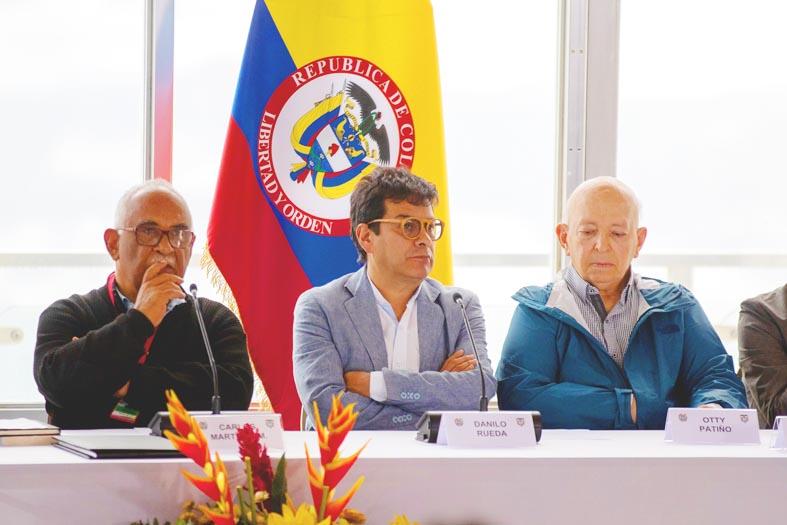The Colombian government and the South American country’s largest remaining guerrilla group resumed peace talks on Monday, breaking a four-year hiatus during which the rebels have expanded the territory where they operate.
Venezuela, whose government resumed diplomatic relations with Colombia only a few months ago, hosted the representatives of the National Liberation Army and the government of Colombian President Gustavo Petro.
The discussions in Caracas are more than a month after the rebels and Petro’s government announced the resumption of negotiations.

Photo: EPA-EFE
The delegates in a joint declaration said that they had gathered to restart political dialogue “with full political and ethical will, as demanded by the people of rural and urban territories that suffer from violence and exclusion, and other sectors of society.”
They added that they are willing to “build peace based on a democracy with justice.”
The National Liberation Army, commonly referred to by its Spanish acronym, ELN, was founded in the 1960s by students, union leaders and priests inspired by Cuba’s revolution. The group is believed to have about 4,000 fighters in Colombia and is also present in Venezuela, where it runs illegal gold mines and drug trafficking routes.
The organization became Colombia’s largest remaining guerrilla group after a 2016 peace agreement disbanded the Revolutionary Armed Forces of Colombia, known as FARC.
Since the deal was signed, the ELN has increased its activities in territories formerly under FARC control.
The group is known for staging kidnappings for ransom and attacks on oil infrastructure, and has been listed as a terrorist organization by the US and the EU.
Previous negotiations, some going back to the 1990s, have failed.
Petro — a former rebel himself — is resuming the negotiations as part of a larger peace effort in which his administration is approaching armed groups, drug gangs and FARC dissidents.
This is a significant reversal of strategy.
Former Colombian president Ivan Duque suspended talks with the ELN after the rebels refused to stop attacking military targets.
Israel Ramirez Pineda, an ELN leader, said in a statement that the group in this negotiating effort aims to produce “fundamental changes” as demanded by the Colombian people during massive demonstrations last year and in polls this year by electing Petro.
“Colombians cannot see each other as enemies, the work we have is reconciliation,” Ramirez Pineda said. “We hope that the government’s delegation will have an interlocutor in the same sense.”

Kehinde Sanni spends his days smoothing out dents and repainting scratched bumpers in a modest autobody shop in Lagos. He has never left Nigeria, yet he speaks glowingly of Burkina Faso military leader Ibrahim Traore. “Nigeria needs someone like Ibrahim Traore of Burkina Faso. He is doing well for his country,” Sanni said. His admiration is shaped by a steady stream of viral videos, memes and social media posts — many misleading or outright false — portraying Traore as a fearless reformer who defied Western powers and reclaimed his country’s dignity. The Burkinabe strongman swept into power following a coup in September 2022

‘FRAGMENTING’: British politics have for a long time been dominated by the Labor Party and the Tories, but polls suggest that Reform now poses a significant challenge Hard-right upstarts Reform UK snatched a parliamentary seat from British Prime Minister Keir Starmer’s Labor Party yesterday in local elections that dealt a blow to the UK’s two establishment parties. Reform, led by anti-immigrant firebrand Nigel Farage, won the by-election in Runcorn and Helsby in northwest England by just six votes, as it picked up gains in other localities, including one mayoralty. The group’s strong showing continues momentum it built up at last year’s general election and appears to confirm a trend that the UK is entering an era of multi-party politics. “For the movement, for the party it’s a very, very big

A new online voting system aimed at boosting turnout among the Philippines’ millions of overseas workers ahead of Monday’s mid-term elections has been marked by confusion and fears of disenfranchisement. Thousands of overseas Filipino workers have already cast their ballots in the race dominated by a bitter feud between President Ferdinand Marcos Jr and his impeached vice president, Sara Duterte. While official turnout figures are not yet publicly available, data from the Philippine Commission on Elections (COMELEC) showed that at least 134,000 of the 1.22 million registered overseas voters have signed up for the new online system, which opened on April 13. However,

ENTERTAINMENT: Rio officials have a history of organizing massive concerts on Copacabana Beach, with Madonna’s show drawing about 1.6 million fans last year Lady Gaga on Saturday night gave a free concert in front of 2 million fans who poured onto Copacabana Beach in Rio de Janeiro for the biggest show of her career. “Tonight, we’re making history... Thank you for making history with me,” Lady Gaga told a screaming crowd. The Mother Monster, as she is known, started the show at about 10:10pm local time with her 2011 song Bloody Mary. Cries of joy rose from the tightly packed fans who sang and danced shoulder-to-shoulder on the vast stretch of sand. Concert organizers said 2.1 million people attended the show. Lady Gaga